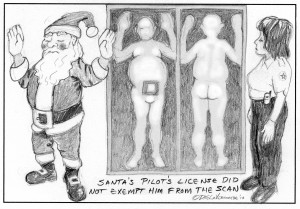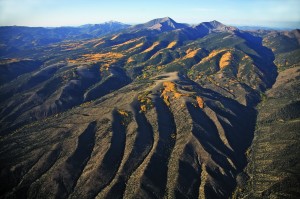By George Sibley
I’m writing in the wake of the election of 2010. Old stuff, you’re thinking, but be assured I am not going to spend much time there. The election strikes me as just one of those surface manifestations of something bigger going on – like the recent volcano-earthquake-tsunami in Indonesia reminds us that we are all adrift on big rafts of stone on a sea of magma.
So what is going on tectonically underneath the volcanic chaos of something like election 2010? On the surface, it seems clear that the Democrats went down because they couldn’t revive the economy they had inherited, so it only made sense. American political sense, that is – to give the mess back to the party that had worked thirty years to create it.
But beneath the surface – here’s an uneasy thought that sneaks into my mind when I try to figure out why the Democrats didn’t manage to get the economy restarted: Suppose our economy cannot be restarted? Economists like Paul Krugman say that the Democratic efforts were just not big enough – but what would have been? Krugman skeptics argue that a bigger effort in the 1930s – the New Deal – didn’t really revive the economy either, that what eventually worked for us then was the example that Germany was setting: turning everything toward a war economy. We have been following that example to some extent ever since, but now we are stuck in two very expensive and seemingly endless wars that are more part of the economy’s problem than its resolution, so that solution isn’t really working anymore either. The Republicans have all but admitted outright that they have no new ideas (in the event that anyone might actually have thought they might).
Suppose, if you will, that America simply no longer has enough real wealth – creativity, energy (spiritual as well as material), gumption, and yes, money – to fire a super-economy that will once again give everyone the lovely old illusion that everyone is on the verge of being rich (and if you aren’t, it’s your own fault?).
The only thing the administration has been able to “stimulate” is a toxic financial sector that has lost all sense of the distinction between wealth creation and just making money. It has been driving the downsizing and outsourcing of the wealth of the nation for several decades, and now has been stimulated to pick up right where it left off when it almost brought the global economy down. Private profits, socialized losses – what a deal.
I read recently about a snowmobile manufacturer in the upper Midwest who has been “forced” by the so-called free market to close his U.S. plants and move production to Mexico because his competitor did. Cutting labor costs and killing American jobs. That’s a Wall Street solution, but what’s “free” about a “free market” that forces that kind of community-killing choice on us all?
So suppose what we really have today is a dying economy based on an ideology dying of exhaustion – onto the sunken chest of which we keep slapping the resuscitation paddles (“Clear!” Zappp), trying to jolt it back to life. But all we have been able to jolt back to some simulacrum of life is the most toxic part of the economy. We may be creating a monster, at least a monstrosity – a “zombieconomy.” It looks sort of like an economy, walks and talks sort of like an economy, but pieces are falling off it, rotten stuff is leaking out, and rather than nurturing life it devours life to give itself the capacity to keep stumbling and bumbling on. A zombieconomy.
Back when we were strong and healthy, we had an industrial economy; we made stuff, converted the raw resources of nature into stuff that we bought and sold to each other. Despite all the talk about transitioning to a “service economy,” or an “information economy,” I think we would really like to be an industrial economy again – and the president has talked about wanting to restore our manufacturing industries; we have all invested (like it or not) in stimulating the auto industry.
But one has to ask: is it just nostalgia, to want to think of America as an industrial giant again, once more leading the way for the world? A lot of economic theorists and cultural analysts are calling America today a “post-industrial” society. Does this mean that, here in America, the Industrial Revolution is over? And if so – did we industrial revolutionaries win? A revolution, by definition, is an effort to overthrow something with the intent of replacing it with something else. So what have we overthrown, and with what are we going to replace whatever it was?
You may laugh, but I think the Industrial Revolution was an attempt to overthrow and remake nature – redesign the natural world in our own image. Our revolution was grounded, rooted in a longstanding rebelliousness stemming from the fact of consciousness, the ability to analyze and rationalize existence. Humans for eons struggled and competed in a world crawling with redundancy, contradiction and diversification carried to an extreme. A beautiful world much of the time, but it was beautiful things or forces randomly eating or flooding or otherwise undoing other beautiful things, all of which offended our urge for order as well as our urge to eat; from the start we defined ourselves by our efforts to reorganize all this exuberant randomness of beauty. To meet our needs, we learned to kill, till, burn, and otherwise reorganize Nature around us. But we were always limited to comparatively small stuff by the fact that it all had to be done with human muscle power (and the muscle of whatever animals we could persuade to work with us).
But this rebellious attitude – cursed in Cain but celebrated in Prometheus (and just viewed ambiguously in Coyote) – got a tremendous boost when we discovered fossil fuels. At that point, our long-simmering rebelliousness flowered into the Industrial Revolution. With fossil fuels, we could change the planet to systems that much more efficiently and effectively met our needs and desires.
It has been marvelous, actually. A true revolution. The average industrial revolutionary today has relatively easy access to better food, better communication and transportation networks, more material abundance than the richest pre-industrial kings. Even those who deplore the revolution and its consequences use its wonderful computers, airplanes, and buildings in the process of deploring it.
It can’t be denied, however, that it has been a violent revolution, with a lot of violence done to nature – species driven to extinction, indigenous peoples destroyed, forests turned to scrub growth or desert, air and water quality generally reduced to the minimum standards for reasonable health. The planet will never be the same.
But what is the Industrial Revolution a violent transition to? A post-industrial what? We know that the fossil fuels that support the Industrial Revolution are finite, ultimately temporary – but then revolutions are supposed to be temporary transitions. So what do we post-industrial revolutionaries move on to now?
My inclination is to want us to behave as though we might have won the Industrial Revolution. Abandoning the achievements would not diminish the collateral damage, all the eggs broken for our omelette. What we have won, thanks to the fossil fuels – “the Oil Interval” – is the opportunity to stand up and look around, and try to figure out how we can use the knowledge and basic technologies we have learned, subsidized by petroleum, to move on beyond petroleum to. Call it what you will: the green economy, the information economy, the education economy, the peace economy, all of the above.
There are signs here and there that we could be moving that way. The president’s “stimulus” that conventional wisdom says did no good? The Gunnison Country Times recently chronicled how the stimulus is supporting about $15 million of good work in the Upper Gunnison Valley – not just slapping the zapper paddles on the old industrial economy, but investing in what we call the “education and culture” component of the local economy. For example, a big wad for Western State College, a million-plus for new facilities at the Rocky Mountain Biological Lab, another million-plus for energy efficiency and conversions to renewable energy. Along with this, everybody seems to be trying to learn to grow potatoes and carrots. There’s a dawning effort to make it a future defined by “different” rather than just “less.” And we are trying hard to not maintain the old all-out war on nature.
I am sure that scores of communities in the United States are also being “stimulated” toward similar futures – not entirely “post-industrial,” to be sure, but potentially less violent and wasteful futures. The zombieconomy, of course, lurches down our streets too. It runs all our banks, saturates the mass media with fear and violence, keeps us addicted to cheap gasoline and corn-syrup food substitutes, taxes us for its plethora of paranoid “wars,” et cetera. But in general, getting down closer to the ground is the only way to feel a germ of hope, here in 2010.
George Sibley was born in Western Pennsylvania, but was conceived in Colorado by Colorado natives, and thus considers himself to be a native Coloradan.


